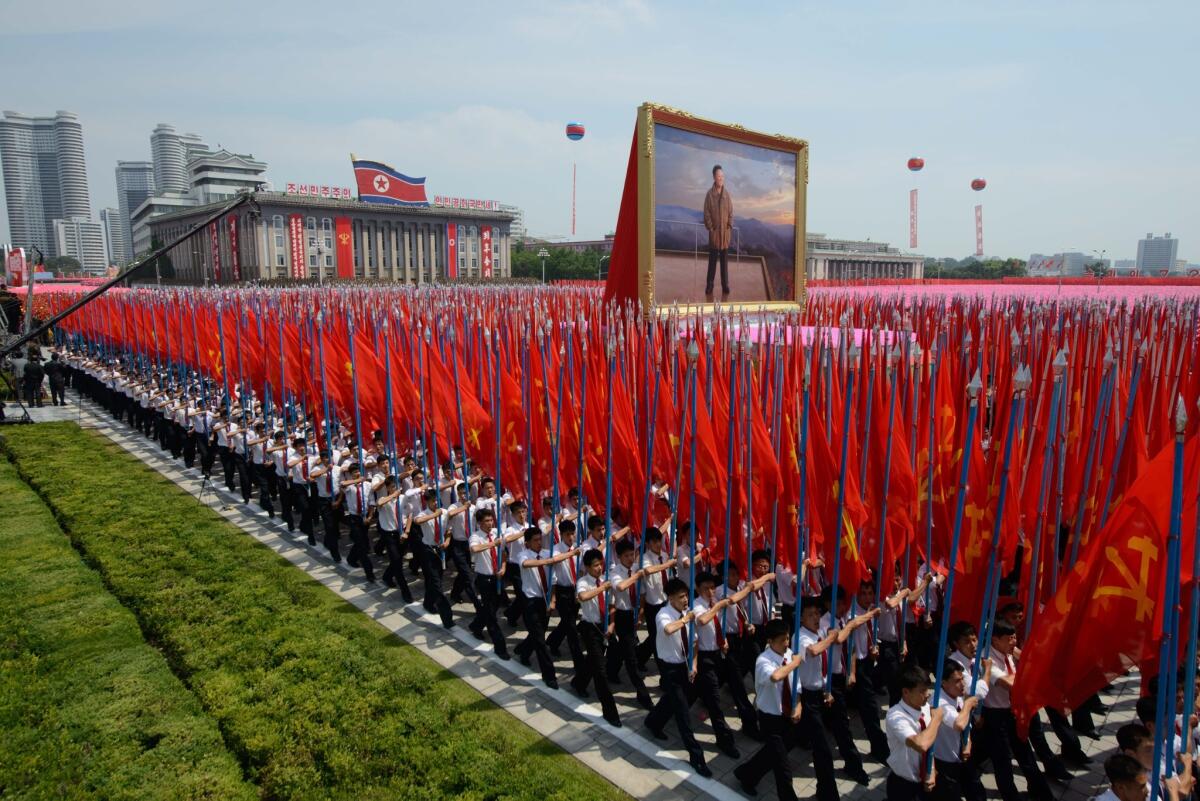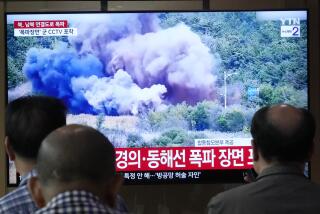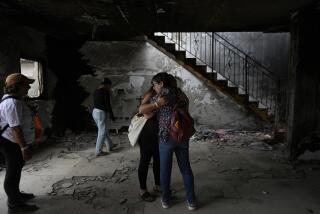Two Koreas diverge as they mark 60th anniversary of cease-fire

SEOUL -- The two Koreas commemorated the 60th anniversary of their cease-fire on Saturday, but in vastly different ways -- the North, with pomp and grandiosity; the South, with grave solemnity.
For the first time in 20 years, North Korea carried out a mass military parade to mark what it calls Victory Day, memorializing the date in 1953 when the Korean War came to an uneasy standstill. More than 10,000 soldiers marched in their usual punctual manner, with tens of thousands of Pyongyang residents cheering in apparent celebration.
North Korea’s young leader, Kim Jong Un, dressed in a black Mao suit, looked over the military parade and was seen smiling and waving to the crowd. The 30-year-old did not deliver a speech, but his right-hand military man, Choe Ryong Hae, spoke about the regime’s strength, which he attributed to its military-first strategy.
“As we have set establishing the economy and improving the livelihood of the people as the primary goal, peace is most significant to us,” Choe said. “If we want peace, we need to be prepared for war.”
Hundreds of international delegates and journalists were invited to observe the event. Among the more notable attendees was China’s vice president, Li Yuanchao, who was seen standing next to Kim and often exchanging remarks.
In the parade, the communist regime showcased Scud missiles and some 300 other kinds of military hardware, according to South Korea’s Yonhap news agency.
While there was no new type of weaponry, experts noted the display of approximately 30 MD 500 helicopters, primarily used by the South Korean army.
“This is a first time for them to show MD 500s, which are allegedly purchased from Germany,” said Park Syung Je, a North Korea analyst with the Seoul-based Asia Strategy Institute.
Also notable: soldiers carrying backpacks with nuclear symbols.
“While showing off their military power, the North again wants to [emphasize] their nuclear state status once more,” said Park.
South Korea, on the other hand, remembered the day through a grand but calm and solemn commemoration. While the North claimed its “victory,” the South clearly remembered the fact that a permanent peace agreement is yet to be reached, and that the two Koreas are still technically at war. This year South Korea proclaimed that it would honor the day as “U.N. Forces Participation Day” as a tribute ro the U.N. troops who fought in the Korean War.
South Korean President Park Geun-hye delivered a speech at Yongsan War Memorial in Seoul, proposing to turn the demilitarized zone between the two Koreas to a peace park, while urging North Korea to become a “responsible member of the international community.”
“In the last 60 years, uneasy peace has been maintained on the Korean Peninsula, with the world’s longest cease-fire,” Park said. “Now, we have to stop confrontation and hostilities and make a new Korean Peninsula. We have to open an era of new peace and hope on the peninsula.”
That has so far seemed a distant dream. Last week, efforts to reopen the Kaesong industrial zone, a joint project between the two Koreas which was shut down by the North in April, ended in stalemate, with Pyongyang threatening to turn the complex into a military base.
The grandeur of Saturday’s parade aside, the Stalinist regime in North Korea is isolated more than ever. Earlier this year, the United Nations slapped additional sanctions on Kim’s government to punish it for a recent long-range missile launch and nuclear test. Last month, Washington added more restrictions by blacklisting North Korean businesses and individuals in its latest efforts to cut off financing for Pyongyang’s development of weapons of mass destruction.
While China’s Li urged Kim to scrap his nuclear weapons program and to return to six-party talks, and Kim reportedly gave a positive reply, the chances of the talks resuming appear slim, experts said.
“In order for the six-party talks to resume, Pyongyang will have to show a sincere action to desert their nuclear ambitions,” said Park Syung Je. “But for now, it is very unlikely for them to give up on nuclear state status.”
In Washington, President Obama commemorated the day with remarks at the Korean War Veterans Memorial, focusing on the contributions of American troops to what has been called “the Forgotten War.”
“That war was no tie. Korea was a victory,” Obama said, noting that South Koreans live in freedom and enjoy a dynamic economy, “in stark contrast to the repression and poverty” of North Korea.
ALSO:
Dominique Strauss-Kahn charged with pimping
Edward Snowden welcome in Venezuela? Not so much
‘Pink Panther’ jail break: Jewel thief escapes with accomplices’ help
More to Read
Sign up for Essential California
The most important California stories and recommendations in your inbox every morning.
You may occasionally receive promotional content from the Los Angeles Times.










